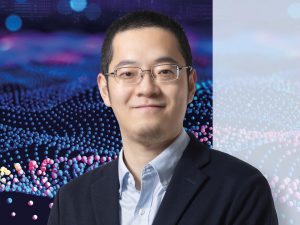A new wave of artificial intelligence (AI) technology driven primarily by vast data repositories is permeating almost every industry. Yang Dingqi, associate professor in the Department of Computer and Information Science in the Faculty of Science and Technology (FST) at the University of Macau (UM), is among experts committed to cultivating talent in data science and expanding the applications of AI.
Boundless Prospects for Innovation
‘Recent years have seen many breakthroughs in AI, ranging from advances in autonomous vehicles to the development of systems that predict protein folding, not to mention large language models [LLMs] like ChatGPT, which has captured the most public attention,’ says Prof Yang.
Prof Yang is an expert in big data, and one of his research interests is developing new schemas for knowledge graphs. This allows for accurate storage of complex knowledge, thereby supporting more accurate predictions and inferences based on such graphs. He is also devoted to the development of graph neural network models for analysing complex graph data.
Over recent years, many people have enrolled in the Artificial Intelligence Applications specialisation under UM’s Master of Science in Data Science programme. This specialisation, jointly offered by the university’s Institute of Collaborative Innovation and FST, covers topics such as computer vision, natural language processing, web mining, big data analysis, and deep learning.
As the coordinator of the specialisation, Prof Yang says that many students have conducted intriguing and practical experiments in AI. In 2022, one student used deep learning models to analyse images of nebulae and identify various stages of nebula formation. Two other students are using LLMs to verify the credibility of information stored in knowledge graphs.
Furthermore, under Prof Yang’s guidance, a master’s student in data science and a master’s student in computer science developed an innovative data system. The system predicts crowd movements within an area that encompasses multiple large public facilities by analysing the spatiotemporal data from mobile devices connected to wireless networks. The system has been further upgraded to predict crowd movements in emergencies such as blocked entrances or fires. A paper detailing this project has been published in a reputable academic journal.
Nurturing the Data Science Mindset
‘Some graduates have moved on to become data scientists, data engineers, or AI instructors, while others are pursuing doctoral degrees,’ says Prof Yang. ‘When faced with challenges across various sectors, they excel at identifying the relevant data, determining the desired outcomes, and linking the two through machine learning models. In essence, they think like data scientists.’
Chinese & English Text / Davis Ip
Photo / Jack Ho
Source: UMagazine ISSUE 28
Related articles:
- Improving Society Through Data Science
- Marketing to Minds With Data
- Extracting Financial Value From Big Data
- Building Trust Through Data Compliance
- Crafting Tailored Cures Through Data
- Developing a Common Language for Humans and Machines
- Data Science Driving Personalised Education
- Leveraging Data to Enhance Public Services


